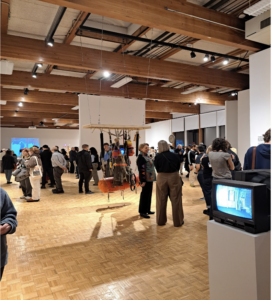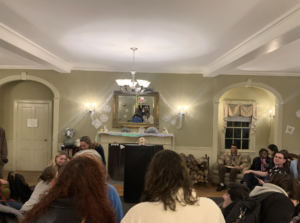On March 23rd, Khal Torabully read from several poems alongside his translator—Nancy Naomi Carlson—for the Bennington Translates series, featuring a number of works on the indentured workers in Mauritius, an event facilitated by Professor Marguerite Feitlowitz and her students for the course The Art of Translation.
Torabully was born on the 14th of August in Port Louis (the capital of Mauritius) an African island nation located in the Indian Ocean: a country that is not only defined through migratory waves, but also a continuous silence behind the narratives of indentured laborers in the country who have undergone intense suffering. “I wanted to give voice to the voiceless,” Torabully says, emphasizing the project of unearthing, unraveling, and reclamation he undergoes in his work.
Torabully is known for his theoretical and artistic concept of “coolitude,” a term derived from the derogatory reference “c**lie,” a phrase attributed to the indentured workers of Mauritius who were brought to the island to work following the abolition of the slave trade. The manipulation of colonial languages—including French (Torabully’s primary language for writing poetry) and English—is central to the development of this theory.
“I experimented with language,” Khal says, “ breaking language in order to enable other voices to be unheard.” He often turns towards archival material in order to undergo this process of reclamation, looking to these primary materials to, “unearth the narratives of the of the indentured…to give voice to these people who are voiceless”
This critical mission reinforces the formal techniques employed in several of his poems. The central image, for example, “a cargo hold of stars,” which makes up the title of his book Cargo Hold of Stars: From Negritude to Coolitude references both historical circumstance and an emphasis on documentary poeticism. The cargo hold is not only a poetic image of beauty and tension; according to Carlson, it refers to an actual, physical space on the ships that the indentured workers were enclosed within, from which “they could see the stars.” As a result, Torabully’s poetry “brings these forgotten lives back to life…thanks to its aesthetic voice,” as Ottmar Ette has written in the Journal of the African Literature Association.
His work stems directly from his own migrant heritage. According to Feitlowitz’s opening message, he “imagines the unimaginable: the suffering, through the ages, of indentured laborers, carried in the same ships that once transported slaves to Mauritian sugar cane fields.”
Torabully likewise employs sonorous techniques in shaping his poems. Between several of Torabully’s presentations, Carlson intercedes to tell the audience to pay attention to the musicality of the French, calling on them to “listen to those sounds.” In one poem shared with the Bennington community, titled “[My Equinox Sails,]” for instance, Torabully’s voice rumbles, the French pitched almost into the back of his throat, slightly percussive yet gentler.
Part of Carlson’s role as a translator is to ensure that these sonic qualities are captured; oftentimes, some translators, in general, tend to sacrifice the rhythm and music of the line to ensure that the conceptual ideas are carried into English. But Carlson feels as though this technique waters down Torabully’s prowess as a writer. “I couldn’t just translate the words,” she tells the audience, for—as Torabully stated later in the talk—he relies, “on the capacity of language and the musicality of language,” to interact together to enact meaning in a kind of, “music of ideas.”
Central to Torabully’s development of Coolitude as a concept is due in part to the work of Aimé Césaire, a French-Martinican poet, and his work in the critical framework called “Negritude.” Negritude is a critique and literary theory following the African diaspora in the 1930s, aimed at raising and cultivating Black consciousness across Africa. “Coolitude,” within this framework undergoes a similar movement, but focuses on “the experiences of first-generation workers together with those of their descendants” within and beyond Mauritius to emphasize a shared history of people who are referred to using the derogatory term “C**lie.”
His work in developing this theory began in 1989, according to Torabully. “I was in France,” he says, as the country was celebrating the bicentennial of the French revolution, “and was struck by the question: what are the missing pages of my history?”
Torabully’s work has garnered wide critical acclaim. Feitlowitz, a member of the literature faculty at Bennington College and a translator/writer herself, described the work as “at once musical and sensual, resilient and revolutionary.” Aimé Césaire (himself a prominent figure in the Negritude movement) who died in 2008, says that “[Torabully’s] work contains all of my humanity.”
Carlson, as a translator, has the difficult job of translating Torabully’s unique literary style. Torabully has stated that, “ordinary language is not enough when giving voice to history’s indentured workers and their horrendous experiences,” resulting in language that is often inventive. Carlson mentions, for example, his use of neologism and sound; as a translator, she says that it is not enough to “just translate the words,” and neologism (the poetic invention of new words) gives the translator a unique task that requires rigorous unraveling. “I have spent many sleepless nights,” says Carlson, “trying to translate his works.”
In working together, Torabully and Carlson unearth narratives of historicity, suffering, and beauty, bringing the “cargo hold of stars”—and the pain and resiliency contained in its narratives—to visibility, in an act of empowerment, endurance, grace, and attention to humanity.










Be First to Comment